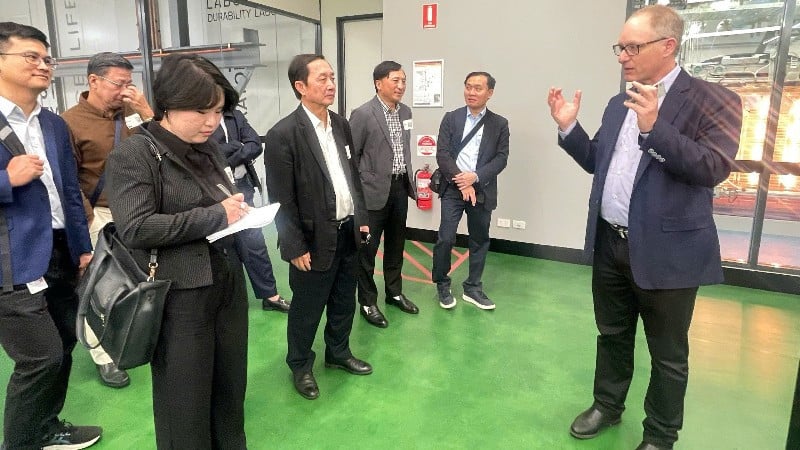
TechLab, built in 2018, started as a single building in the southern suburbs of the city, and has now grown to five buildings, forming a UTS technology testing complex.
University-enterprise linkage model
Welcoming the delegation to a research lab, Professor Brett Oberstein, Director of Business and Professor of Industry at UTS, emphasized that what we saw was just a small part of the countless laboratories, testing areas and production facilities operating here. This space is where researchers, businesses and even public agencies connect, forming a very dynamic innovation ecosystem.

While the units in the school focus on researching early ideas and advanced research directions, TechLab prioritizes the stages of prototype development, verification and practical testing, where initial research results are brought to the application environment to assess the level of readiness.
The special feature of this model is that businesses can directly set up offices, test equipment, or even set up pilot production lines right on campus.
The presence of businesses helps research activities to be linked to market needs, while creating opportunities for students to access technology, data, and equipment throughout their studies.
“We support industry partners, startups and even overseas businesses looking to set up operations in Australia by providing office space, lab space and manufacturing facilities. The industry partners we support all belong to certain ecosystems,” Mr. Brett shared.

The TechLab ecosystem, as Brett put it, is defense-space, climate change-sustainability, and manufacturing-manufacturing. We were introduced to each ecosystem, which has minilabs to create real-world test models. A typical example is the “green wall” installed at UTS’s main campus in the city center, where a Japanese company collaborated with the university to test agricultural sensors in natural conditions. Data from the sensors is collected continuously, serving both research and technology validation.
A consortium-based environmental management system is also being operated within the UTS building to support joint research. A battery manufacturing facility is being built to serve as a “living laboratory” for energy materials research. UTS also has a water and wastewater testing centre for industrial use.

Speaking about the defence-space ecosystem, Professor Brett Oberstein highlighted that this is one of UTS's most prominent capabilities. The professor said that TechLab facilities have been certified to handle confidential Australian Government data, allowing the university to conduct many sensitive research projects right on campus.
From this foundation, UTS attracts leading aerospace companies. “One of our partners is Space Machines Company, which operates Australia’s largest satellite manufacturing facility on the UTS campus,” Professor Brett said. He also mentioned BXB Aerospace, which develops electric propulsion for satellites, and Navigation Advanced, which produces high-precision navigation technology that is used in 17 locations around the world .
What is most impressive is the flexible cooperation mechanism between UTS and businesses. Professor Brett said that the school is almost completely autonomous in signing contracts, using equipment and implementing projects, as long as it complies with general regulations of the Government. Answering our delegation's question about business investment here, Professor Brett shared that industrial partners invest most of the machinery in TechLab.
TechLab receives around $20 million in industry funding for research each year, while the university invests more than $70 million in equipment itself. Industry-funded projects often allow the university to use all the equipment and data without complicated procedures. In particular, if the industry pays for the research, they will retain all intellectual property rights - a mechanism considered flexible in Australian universities.
Training linked to practice
In addition to research and technology testing, UTS places great importance on training based on a system of specialized laboratories. The spaces at TechLab are not only for research but also serve as training facilities for students and industry partners who need to be nurtured and updated with new skills and technologies. The fact that businesses place equipment, testing models and production lines right on campus creates a learning environment closely linked to practice.
It is known that UTS students and researchers not only participate in simulation or research stages, but also directly work with production lines, real equipment and real data. “The fact that businesses bring the entire production line into the school has created a research-training environment linked to practice that not many universities have,” Professor Brett said.

Jamine Hoang, a UTS Software Engineering student who is currently in charge of guiding interns at TechLab, said this model gives learners experiences that cannot be found in the lecture hall.
In the role of instructor-coordinator of student internships and supporting the team working with clients, Hoang shared: “We use what we learned in 4 years of university to work with clients, both building our career profiles and participating in large projects on the environment and architecture, while also helping the community.” It is known that the projects that Hoang participates in are all in direct coordination with local councils such as Ryde, Hawkesbury, MidCoast or Renwick.
According to Hoang, the 3-month internship helps students get used to a professional way of working, with assignments, deadlines, group meetings and real partners. “Going to school normally for 2-3 hours every day and then doing homework, there is no continuous structure like this. This is an opportunity for us to know what we need when we start working.”
The internship program at TechLab is now also expanded to students from many other schools. Hoang said: “We also work with other universities to expand and find more opportunities for students.”

Suggesting many experiences in promoting innovation
It can be seen that the TechLab model of the University of Technology Sydney is a testament to the practical approach in promoting innovation, which is to put businesses at the center, universities as a bridge and the government creating a connecting environment. This is also the direction that Vietnam is pursuing. From the actual study of the TechLab model, Mr. Vu Quang Hung, Member of the Standing Committee of the City Party Committee, Head of the Management Board of the High-Tech Park and Industrial Parks of Da Nang, said that models like TechLab suggest many experiences for localities in forming technology testing spaces right in the high-tech park.
Mr. Vu Quang Hung said that Da Nang is identifying start-ups, innovation and incubation of technology businesses as one of the key tasks to implement Resolution 57/NQ-TW. As the management agency of high-tech parks and industrial parks, the Management Board attaches special importance to incubation and support for technology start-ups, considering it the foundation to promote new growth of the city. “We hope to form a connection between UTS, Danang University and the Management Board of Da Nang High-Tech Park and Industrial Parks to build a systematic start-up and incubation program.

For its part, the Management Board will promote working with businesses with financial potential to support potential start-up ideas; at the same time, we are ready to arrange land funds in the High-Tech Park for incubation projects to be implemented in practice. The goal is that innovative products can be developed and applied immediately to the production activities of businesses, creating practical effects for scientists, businesses and localities," Mr. Vu Quang Hung shared after visiting and learning about the model at UTS.
Sharing the same view on the central role of universities in connecting with businesses, Mr. Bui Thanh Toan, Member of the Provincial Standing Committee, Director of the Department of Science and Technology of Dak Lak province, said that after studying and learning, the most important thing is to find a way to flexibly apply these models in the actual conditions of each locality. “Techlab's model is very good in connecting institutes-schools-businesses, and at the same time they can be self-sufficient in funding for research activities. This is a very important lesson for us.

Currently, many localities, especially provinces and cities with potential, are also considering building similar labs. But the key issue is to mobilize the business community to participate in building, deploying and operating the model. That requires great initiative from universities and research institutes in connecting and establishing cooperative relationships with businesses. When large enterprises support funding for research activities, in return, institutes and schools provide products and technological solutions to serve the production and business activities of the enterprises. This is a two-way operating model, creating a sustainable innovation ecosystem. And we need to seriously research to deploy in Vietnam.

Regarding Dak Lak, Mr. Bui Thanh Toan said that he has been interested in and researched this direction from an early age, and some initial models have been formed. However, like many other localities, the connection between universities and research institutes with the business community is still limited. “Some large enterprises currently place research orders, but they are mainly located in strong technology centers in Hanoi, Ho Chi Minh City, Da Nang, etc., where high-quality human resources are concentrated; the initiative of institutes and schools in connecting with businesses still faces many difficulties. This is something we are trying to improve in the coming time,” Mr. Bui Thanh Toan worried.
From a policy-making perspective, Mr. Huynh Thanh Dat, member of the Party Central Committee, Deputy Head of the Central Propaganda and Mass Mobilization Commission, Head of the delegation of cadres for short-term training in Australia, said that the core factor in forming similar "test-labs" in Vietnam is the initiative of universities in connecting with businesses. Both sides must build trust and professionalism in cooperation. Businesses must believe in the research capacity of the school, and universities must also understand the actual needs and accompany businesses. In addition, the role of the State in creating is very important.

“In Australia, I see that the State gives universities a lot of power in connecting with businesses, including in exploiting land and infrastructure, and especially creating conditions for businesses to invest in research, order products and accompany them throughout the entire innovation process,” said Mr. Huynh Thanh Dat.
Mr. Huynh Thanh Dat also affirmed that in reality, the relationship between universities and businesses has begun to take shape, both sides have needs and have certain cooperation, but the most lacking is a synchronous mechanism framework. Specifically, universities and businesses want to cooperate deeply but the current mechanism does not really allow for flexible implementation. The State does not have a clear financial mechanism to support joint research activities or for the commercialization of scientific products. Businesses want to invest in research but lack a legal corridor to feel secure in long-term cooperation.

Therefore, Mr. Huynh Thanh Dat emphasized, the State needs to have an open mechanism so that after universities have successfully conducted research, they have full authority to coordinate with businesses to commercialize the research results. The State also needs to have a policy to partially support the funding for these joint programs, to encourage universities and businesses to "join hands" more strongly.
Source: https://nhandan.vn/khong-gian-thu-nghiem-cho-doi-moi-sang-tao-tu-mo-hinh-techlab-cua-uts-post922825.html


![[Photo] Unique art of painting Tuong masks](https://vphoto.vietnam.vn/thumb/1200x675/vietnam/resource/IMAGE/2025/11/14/1763094089301_ndo_br_1-jpg.webp)



![[Photo] Unique architecture of the deepest metro station in France](https://vphoto.vietnam.vn/thumb/1200x675/vietnam/resource/IMAGE/2025/11/14/1763107592365_ga-sau-nhat-nuoc-phap-duy-1-6403-jpg.webp)

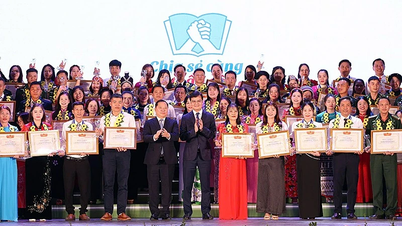
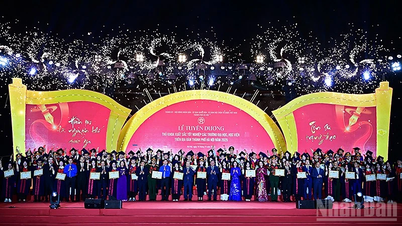
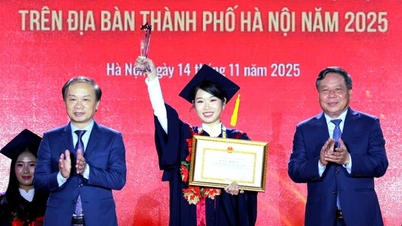

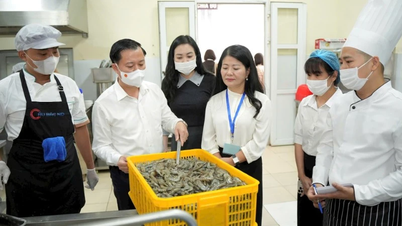


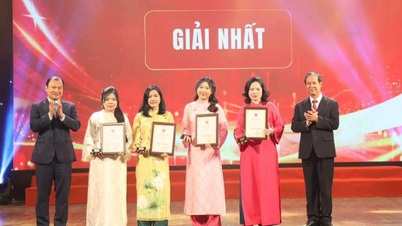




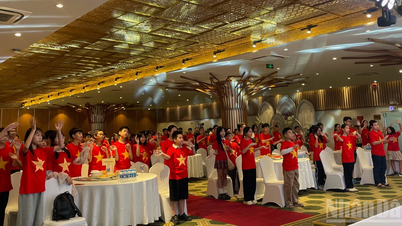

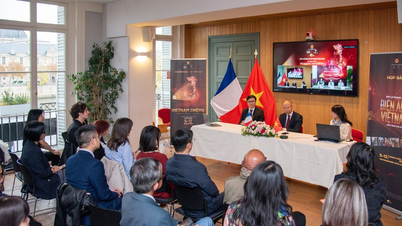

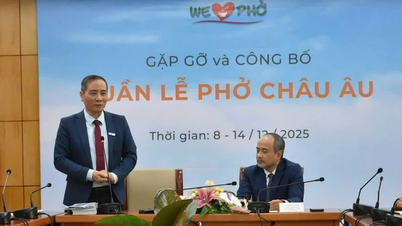
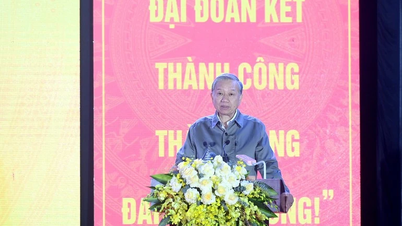
![[Photo] Special class in Tra Linh](https://vphoto.vietnam.vn/thumb/1200x675/vietnam/resource/IMAGE/2025/11/14/1763078485441_ndo_br_lop-hoc-7-jpg.webp)












































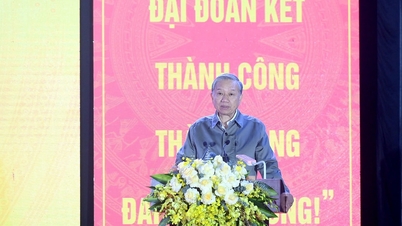



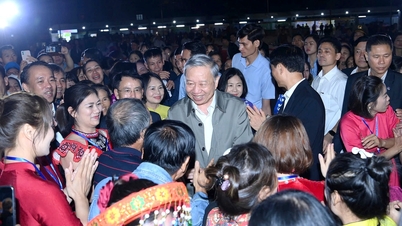
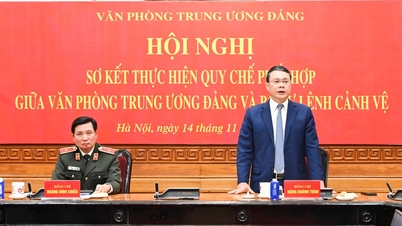




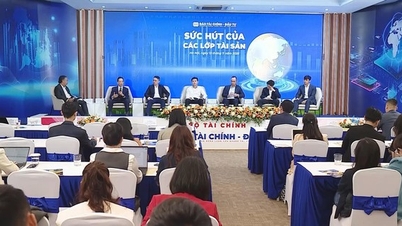
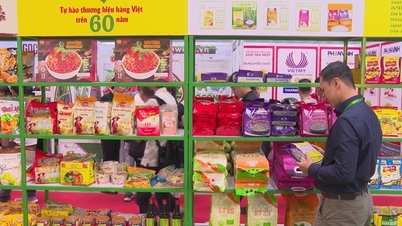
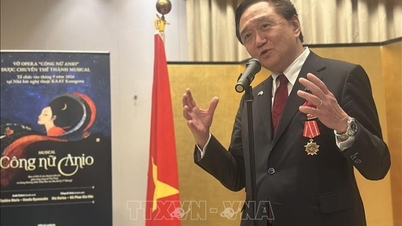

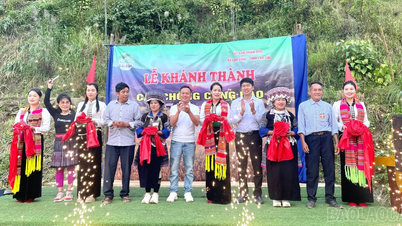

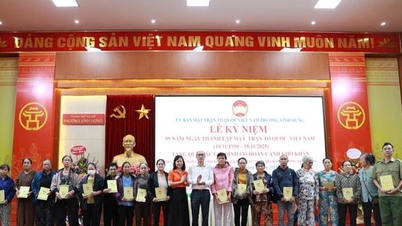













Comment (0)